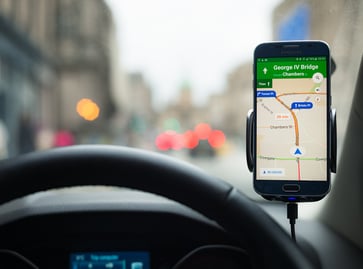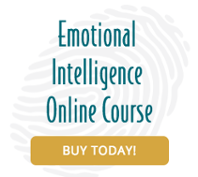Have you ever felt like your emotions are in the way of true happiness? Do the daily hassles, frustrations, and disappointments seem to crowd out joy? Perhaps, anger thwarts meaningful connections with your teen or spouse. Hmm.
Maybe you're passionate about growing your business, but your fear and insecurity derail productivity and essential actions. Hmm.
Or are you stressed out and struggling with anxiety?
There is a remedy that will make a huge difference in all of the above challenges—one gateway to inner peace.
Estimated reading time: 4 minutes

Whatever problems you may have, I am convinced that they all lead back to missing skills in the processing and handling of your emotions effectively. Emotional well-being begins with the modulation of your emotions with self-compassion.
Making Emotional Intelligence a Priority to Achieve Inner Peace
Although emotional intelligence has been proven to be critical in life, success, relationships, work, and families, we still really don't make it a priority.
Why is that?
Perhaps we're too busy getting to the next best thing.
Maybe we'd rather binge on Netflix or are captivated by the daily news. And it might just be easier to distract ourselves from the dissatisfactions and conflicts in life, right? Others prefer checking things off their to-do lists; after all, getting things accomplished helps us feel good about ourselves.
Today's culture is a colorful diversion that can blur our priorities and dull our longings. However, purpose, fulfillment, healthy relationships, and inner peace require us to be aware and awake, to live and consciously choose the road less traveled.
The very act of taking the time to learn new emotional fitness skills is a quality of having some emotional intelligence! What a conundrum.
The ability to effectively regulate our energy and emotions allows us to carve time for what truly matters. Making minute-by-minute choices to be our best self is an art and a science. Sensible decisions are guided by both logic and emotion, even though we've been led to believe that it's logic alone that makes sound decisions.
Whether you're making a big life-changing decision, such as a new career move
or a small decision as simple as turning down an extra glass of wine or a piece of chocolate cake, we need to tune into ourselves to find our way.
And tuning in to ourselves and our inner landscape asks us to consider the emotional INTEL we are experiencing and feeling, which we're either utilizing or we're not.
The quality of our lives depends on how well we manage emotional energy and monitor our perceptions.
Being stuck or unhappy often boils down to unprocessed emotions. Whether it's a distraught parent or a frustrated leader in a big company, people's problems stem from their mindsets and emotions. When it comes to feelings, we stuff, ignore, shame, suppress, erupt or shut down through depression. And let's not forget about anxiety, an epidemic across all ages.
Emotional intelligence skills can all be learned, so this ability gives us an excellent opportunity to transform our lives.
Related reading: "How to Find Inner Peace by Resolving Conflicting Feelings"

The Importance of Emotional Literacy
Have you ever noticed how your energy gets zapped when you avoid a problem or resist the need to resolve a conflict?
Pretty exhausting, isn't it?
So how do you up-level emotional fitness and practice being more mindful and conscious?
The key lies in increasing emotional awareness and managing your time and energy.
Emotional literacy is at the heart of all emotional intelligence. We need to understand our emotions and why we have them.
Emotions are energy in motion; they are meant to move through us fluidly. Whenever we stop an emotion, we freeze energy, and
Another very important reason to FEEL is that when a feeling is ignored or blocked, we also deny ourselves important information and insight into ourselves and what we need. Social and emotional development are critical for succeeding in life. And learning to understand and calm emotions is key to achieving inner peace.
Emotions are an invitation to be true to ourselves!
Think about that for a moment. Not only are your emotions inviting you to be
 Let's use technology as a metaphor for using our emotions as a GPS. With
Let's use technology as a metaphor for using our emotions as a GPS. With
a simple click or press
of a button, our cars and
cell phones tell us the best route to travel.
This information helps us find a location quickly and avoid getting lost. The network also redirects us around heavy traffic or road construction.
You have an inner wifi, too!
If you don't connect to your phone wifi, you can't access these alerts or maps, right?
And if you don't connect to yourself and your inner wifi, there's no accessing the truth of YOU. And that would be a travesty, wouldn't it?
To gain mindfulness is a decision. As soon as you commit, your energy follows. Awareness may take practice, yet it's worth it because the information is too valuable to lose. As Nike says, "Just do it!" Below are steps that will help you grow in emotional fitness and learn to honor yourself better.
The Steps to Greater Emotional Fitness
STEP 1: Increase Your Awareness.
The first step in gaining greater awareness is through knowledge. By putting your attention on what you're feeling inside and how different people or experiences affect your moods, you'll be able to make wiser choices. Your responses to your experiences create the quality of your daily life. If you only practice this first step, you'll have already become more emotionally intelligent.
STEP 2: Identify the feeling and name it.
The second step is to pay attention to WHAT you're feeling and name it. As soon as we name an emotion, there is an inner calming effect.
Becoming curious about what you're feeling helps you know how you are affected in your relationships and experiences. Instead of pushing your feelings aside, learn from them.
STEP 3: Decode your feelings and act on what you need.
 The third step is to figure out what your emotion is actually telling you.
The third step is to figure out what your emotion is actually telling you.
If you're feeling lonely, you may need to go out with a friend for lunch or hike with one of your co-workers.
If you're feeling bored, perhaps you don't have enough pleasure or recreation in your life. It might be time to reengage in one of your favorite hobbies.
When you feel resentful or angry, it might signal disrespect in your relationships. This tolerance can show up as others not valuing your opinions, dismissing your feelings, or overlooking your needs, which can be emotionally draining. It may be time to set healthier boundaries, an act of self-respect that communicates your worth. This ability involves defining what is acceptable to you and requires courage and clarity.
These angry feelings might also reflect your internal state.
You could be upset with yourself, especially if you often sacrifice your desires for others. While well-intentioned, this can lead to frustration and a sense of losing oneself as a people pleaser. Acknowledging your feelings is crucial to honoring your own needs and desires.
Closing Thoughts
By using your emotional GPS, you can create a more balanced and fulfilling life where relationships are based on mutual respect and understanding.
Start small and be consistent.
When we're consistent, change happens quicker. But if you forget, the new practice becomes being kind to yourself for slipping up. Then get right back to building greater awareness.
For a more elaborate step-by-step process, see "5 Steps to Reset Your Emotions and Find Inner Peace."
To learn even more about emotional intelligence training, I've created a resource that distills some of the best of my two decades of learning and teaching.
Check out our online course, "Emotional Fitness for the 21st Century." The course includes the nuts and bolts of emotional intelligence. You'll learn how to listen to your emotions, develop empathy for others, and set healthy boundaries. The training comes with discovery worksheets, step-by-step skill charts, tips for success, and practice scenarios.
It's time









